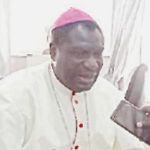The New York Times report of March 13, 1976 put the story of Nigeria’s perennial human sacrifices by the bloodthirsty grove of coup-plotting most startlingly. The day before, newly appointed Chief of Defense Staff, Brigadier Musa Yar’Adua, had announced that former Defense Minister, Major General Iliya D. Bisalla and 29 others, had been executed by the seaside suburb of Victoria Island. The 30 were killed for their roles in the assassination of military Head of State, Murtala Ramat Mohammed, alongside his aide-de-camp, Lieutenant Akintunde Akinsehinwa.
While announcing the execution, Yar’Adua also called on Britain to extradite ousted Head of State, General Yakubu Gowon, then student of Political Science at Warwick University in England, to answer charges of co-plotting the coup. Gowon, by Col Buka Suka Dimka’s confession, had invited him to London when he (Dimka) traveled to Madrid, Spain on official assignment and asked him to contact Bisalla for execution of the coup. Abdulkarim Zakari, a radio journalist, said to be a relative of Victoria, General Gowon’s wife, was also executed. Dimka, who also participated in an earlier counter-coup of July, 1966 which topped General Aguiyi Ironsi, was as at this time still being interrogated to further implicate Gowon. He was later publicly executed at the Lagos Kirikiri Maximum Security Prison on May 15, 1976.
Sixty nine years after the July 23, 1952 first coup in Africa called the Egyptian Revolution of 1952, led by Mohammed Naguib and Gamal Abdel Nasser and which overthrew King Farouk and the Muhammed Ali Dynasty; 55 years after its first variant in Nigeria that took place in 1966, the word “coup” is rearing its ugly head again.
The Nigerian presidency and the Defence Headquarters (DHQ) resurrected the ghost of coup and coup plotting. Elder statesman, Robert Clark, SAN, initially belled the cat by amplifying what hitherto were hushed tones on Nigerian streets. Speaking on a Channels Television programme recently, he had said that, in view of the near total collapse of Nigeria in the hands of President Muhammadu Buhari, he should hand over the administration of Nigeria to the military. Onyema Nwachukwu, Brigadier General and Acting Director Defence Information, in a May 3, 2021 press release, would however have none of that. He warned politicians and soldiers against any collusion to foist another military coup on Nigeria.
If anybody thought that the idea of a military coup was the figment of the imagination of the above two actors, the Nigerian presidency also jumped into the frenzy. On Tuesday last week, Special Adviser to the President on Media and Publicity, Femi Adesina, also alleged that some “disgruntled religious and past political leaders” were plotting to overthrow government. Elder statesman and SAN, Chief Afe Babalola, was one of the conveners of the proposed conference. So Babalola, who has undoubtedly made more contributions to this federation, even more than Buhari, is now disgruntled?
Why would coup and coup discourses dominate political analyses of the chaotic Nigerian governance space at the moment? Why has Buhari, who rode into power in 2015 in a galaxy of talisman-like public acceptance, become, six years after, this disreputable and worthless in the estimation of same Nigerian people?
Until the 1990s when democratic waves began to sweep through Africa, the continent had been a hotbed and volatile region of the pestilence of military coups. Between January 1956 and December 2001, there were over 200 coups in 48 independent Sub-Saharan African states, including Nigeria. Many others have since taken place, 21 years after. Whether in the 80 successful coups de tat that took place during this period of 45 years interval, the 108 failed attempts and 139 reported coup attempts, the pestilence of coup in Africa during this period cannot be overemphasized.
In virtually all the countries on the continent where coup took place, as salvationist as they portended to be, the military have often left such countries worse than they met them. Either through their inordinate ambition to transmute into civilian dictatorship, sit-tightism or recourse to draconian rule, the barrel of a gun defined a huge chunk of African governance.
In Nigeria, for instance, the 1966 military coup that brought Aguiyi-Ironsi and his wayfarer military colleagues into government truncated the series of development hitherto witnessed in all the three regions. It also collapsed the federal system of government that was the best answer to the Nigerian plural question, setting the country on a path of future implosion and destruction. Soldiers barely off mental diapers but who had acquired fat epaulettes on account of their involvement in coup-plots, suddenly took over the administration of Nigeria, many of them in their 20s and 30s.
Other than “about turn!” “salute!” and “stand at ease!,” many of the soldier-rulers didn’t have understanding of how a country as diverse and multi-ethnic like Nigeria could be managed. They had nil understanding of economics and society and thus dragged Nigeria to their personal mental prostrate levels. In defence of ego, soldiers took Nigeria to a very costly war and could not manage the huge petro-dollars that accrued to the country. That was why Yakubu Gowon, on a visit to the Bahamas, could announce that Nigeria was so stupendously wealthy that she didn’t know what to do with her wealth. Nigeria was so audaciously profligate that she paid salaries of workers in some African countries, pumped billions into liberation movements in Africa and as recent as in the 1990s, was playing Father Christmas roles in Liberia and Sierra Leone. In the process, Nigeria failed to build a tomorrow for generations yet to come.
The question to ask is, why have unconstitutional hijacks of democratic governments in Africa become pastimes? What can be said to be the real sociopolitical conditions of Africa that nurture this seedbed of hijacks of power? While some experts say that the prevalence of coups in Africa cannot be divorced from incompetent civil leadership and corruption, others put it at the doorsteps of dictatorial regimes, mismanagement of the economy and desire of the military to posture as Messiahs.
Narratives of corruption today under Muhammadu Buhari are worse than what was in place that pushed Chukwuma Nzeogwu to plan the January 15, 1966 coup. Gowon and his triumvirates also claimed that killing of northerners was reason why he and the coupists of July 28, 1966 struck. Today, insecurity and killing of northerners and southerners are far worse today under a man who was elected based on the belief that, as a retired General, his military bravura would stop genocidal insurgents.
Colonel Dimka must have sought forgiveness from Murtala Muhammed for killing that mercurial temperament soldier, if he could see what is happening today in Nigeria from the land of the dead. Speaking in a national broadcast after the assassination of Muhammed, Dimka had said that the widespread orgy of “corruption, indecision, arrest and detention without trial, weakness on the part of Mohammed and maladministration in general” were reasons why he overthrew Murtala’s government.
In 1983, Buhari and his allies claimed they upturned the Second Republic due to the widespread corruption of the political class. Can anyone juxtapose the quantity of corruption under Shagari with one under Buhari now? Paradoxically, then Major General Ibrahim Babangida, on August 27, 1985, also claimed that he overthrew Buhari because, “he was too rigid and uncompromising in his attitudes to issues of national significance.” Buhari has since morphed from being rigid into an ethnic jingoist who gives terrorism wooly padding and supervisor of a comatose economy.
The Major General Mamman Jiya Vatsa December 1985 coup against Babangida was said to have cited worsening situation among military personnel, among other reasons, for its attempted coup. The April 1990 coup that followed, masterminded by General Gideon Orka, claimed that the Hausa-Fulani had constituted themselves into the lord of Nigeria. The last known military overthrow of a civilian government in Nigeria was the palace coup led by General Sani Abacha and which took away the interim administration of Ernest Shonekan. It based its strike, among others, on the lack of legitimacy of the interim government.
If we then juxtapose the alibi for truncating governments in Nigeria in the past with the current state of affairs under President Buhari, will one conclude that Nigeria was ripe for a coup, is due for a coup or shying away from its due worth of a coup? If the truth must be told, but for the fact that coups have lost their relevance in the world and military hijacks have proved to be incapable of solving democratic problems, the current state of hopelessness in Nigeria makes the country ten times ripe for a coup. Deliberately or through his manifest incompetence, President Buhari has driven Nigeria to the brinks of war. Reasons adduced for all the coups in Nigeria since 1960 pale into insignificance when compared to the abyss that Buhari has taken Nigeria. Killings under his watch will rank side by side killings during the civil war, with government advertising ineptitude and incompetence like a sore thumb. Even under Abacha, there was never this level of general consensus that Nigerians are being ruled by Mephistopheles himself.
The question to ask is, if the military takes over from Buhari today – God forbid – what will be the general mood of Nigerians? Abacha’s personal and governmental expiration which elicited widespread jubilation unrivalled in Nigerian history, will be child’s play compared to what will happen.
With all the above however, there is still no alternative to civilian rule. As horrible, close-to-breaking-point as Nigeria has become under Buhari’s watch, the hopelessness he foisted on the polity should increase our future scrutiny of our leaders and squeeze a resolve from us never to have a Buhari kind in government again. Ousting Buhari and getting him replaced by a military junta will only give us Pyrrhic victory over one of the most infernal civilian rules in the history of Nigeria.
YOU SHOULD NOT MISS THESE HEADLINES FROM NIGERIAN TRIBUNE
Fake Website Asking N-Power Candidates To Verify If They Have Been Shortlisted For N30,700 Grant
CLAIM: A viral post on WhatsApp is asking N-Power candidates to verify if they have been shortlisted to receive ₦30,700 Batch C grant
VERDICT: FALSE. Registration can make you lose your WhatsApp account to scammers.
FULL TEXT: A viral post on WhatsApp is asking N-Power candidates to verify the status of their application and see if they have been shortlisted for the batch C cash grant…
Inside Ibadan Bound Train From Lagos
The train started the 156.65 kilometres journey to Lagos at exactly 08:00hrs. The pace of its acceleration was minimal.
At about 25 minutes, the train slowed down at the uncompleted Omi-Adio terminal, a village on the Abeokuta/Ibadan expressway; it’s a stone throw from Apata in Ibadan. Conveyance of passengers from there and other terminals has not kickstarted as the terminals are still under construction and workers were found there…
Killer Herdsmen: Untold Story Of Ibarapa’s Worst Nightmare + VIDEOS
“Please do not talk to my father. He is yet to come to terms with the death of his son. It is a most tragic experience. How does one quantify the loss of a dear brother? My brother was killed like an animal by two herdsmen. His offence was that he asked them to drive their cows off his already cultivated farmland,” Bisi Olaosepin, whose brother was hacked to death, struggled to hold back his tears as he relayed to Sunday Tribune the horrible experience that culminated in the passage of his brother…
WATCH TOP VIDEOS FROM NIGERIAN TRIBUNE TV
- Let’s Talk About SELF-AWARENESS
- Is Your Confidence Mistaken for Pride? Let’s talk about it
- Is Etiquette About Perfection…Or Just Not Being Rude?
- Top Psychologist Reveal 3 Signs You’re Struggling With Imposter Syndrome
- Do You Pick Up Work-Related Calls at Midnight or Never? Let’s Talk About Boundaries







